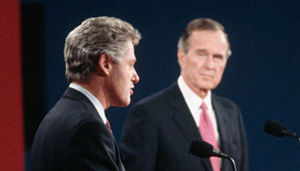United States presidential election, 1992
Campaign
Bush enjoyed historically high approval ratings after his decisive military victory in Operation Desert Storm in 1991, but that had evaporated by the time of the election. Ironically, the fall of the Berlin Wall and collapse of the Soviet Union under Bush's Presidency hurt him in his reelection campaign in that it resulted in foreign policy not being a prominent issue, with no Soviet threat. The campaign focused almost entirely on domestic concerns and an economy that was believed to still be in a recession.
A prominently placed sign in Clinton’s campaign headquarters read "It’s the economy, stupid!" Bill Clinton ran a different, more youthful campaign, by making frequent appearances on MTV and daytime talk-shows, and took questions from live audiences, which proved to be a comfortable setting for him. He distanced himself from past Democratic Party candidates like George McGovern, Walter Mondale and Michael Dukakis, by running as a centrist. He cited the ticket’s support of the death penalty, a balanced budget, middle class tax cuts and a desire to "end welfare as we know it." Clinton had baggage of avoiding the Vietnam War and past drug use, but the press didn't push those themes and disenchantment with Bush won out. Once in office Clinton was actually far more liberal than he had convinced the public he would be, but was curtailed back to a more moderate position after the Republican Revolution of 1994 gave the Republicans landslide victories and control of both Houses of Congress.
George H. W. Bush trailed in the polls for the entire campaign. Several of his speeches and political ads focused on the Gulf War, fall of the Berlin Wall and experience to illustrate his success as commander in chief, but his message did little to help his standing. The aftermath of the Gulf War when Bush asked the Iraqis to rise up against Saddam, which the Shiites and Kurds did - only to be stamped out by Saddam while the United States did nothing, left a bad taste in the mouths of the American populace. Bush explained he meant for Saddam's troops to rise up against him, but the damage had already been done. With Saddam still in power and the majority of Iraqis suppressed and punished, the luster from the Gulf War victory had faded. Furthermore, Bush's giving in to a tax increase during his term after running in 1988 under the 'Read my lips - no new taxes' theme angered many backers within his own party. More moderate than Reagan had been, Bush could do little to find an issue to energize his party or the American people. In the debates he stressed the idea of the American people giving him a Republican Congress to work with, which at the time seemed out of touch as the Democrats enjoyed large leads in both the House and the Senate. His campaign never caught fire. Attempts to paint Clinton as lacking experience didn't resonate.
In Ross Perot’s surprisingly strong third-party campaign he ran as a successful businessman who was qualified to fix the economy. He damaged the Bush campaign by asserting that the economy was worse then it was and giving disenchanted voters who didn't want to support Clinton a protest vote. After Clinton had been elected President, economic numbers came out showing that the recession had actually ended before the election, but the public didn't have this information when they voted.
Results
| Candidates | Party | Popular vote | Percent | Electoral vote |
|---|---|---|---|---|
| Bill Clinton | Democratic | 44, 909, 806 | 43.0% | 370 |
| George H.W. Bush | Republican | 39, 104, 550 | 37.4% | 168 |
| H. Ross Perot | Independant | 19, 743, 821 | 18.9% | 0 |
| Andre Marrou | Libertarian | 290, 087 | .28% | 0 |
| Other | Other | 375, 659 | .36% | 0 |
